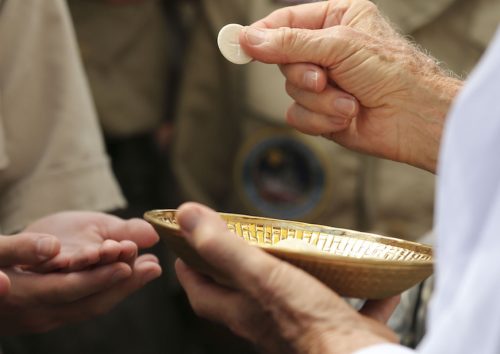Q. I recently attended a funeral Mass for a friend — not at my own parish. The pastor informed the family of the deceased that there could be no eulogy given in church — before, during or after the funeral Mass. They were quite upset because they had already asked a family member to deliver the eulogy.
This same parish had for years allowed family members or friends to speak and eulogize their loved one during a funeral Mass; the change in policy came with the arrival of a new pastor, who said that eulogies should never have been allowed previously, and he cited canon law in support of that. What is the official position of the church, or is it up to the discretion of the local pastor? (Mayfield, New York)

A. The pastor may have been referring not to canon law but to the Order of Christian Funerals, which is the church’s guidebook for such celebrations. The guidebook does say that “there is never to be a eulogy” (No. 27). But that section is meant to offer guidance to the priest-celebrant with regard to the homily.
It reminds the celebrant that a Catholic funeral is not to consist in the glorification of the deceased (even less, the “canonization”); the funeral Mass instead is meant to use the scriptural readings to highlight the redemptive power of Christ’s resurrection, to pray for the deceased and to comfort the mourners by reminding them that eventual reunion awaits in heaven.
The same Order of Christian Funerals says in a later section that “a member or a friend of the family may speak in remembrance of the deceased before the final commendation begins” (No. 170). Some dioceses have their own regulations, limiting the length of those remarks. (Three or four minutes would be typical.)
Recently, I have noticed that some parishes move these family remarks up to the beginning of the liturgy — perhaps feeling that if the speaker strays from the purpose of the Mass, the celebrant can “rescue” the situation by returning to the themes of resurrection and reunion. In the end, though, much of this does depend on the discretion of the local pastor, who I hope would take into account the feelings and desires of the grieving family.
Q. I am surprised by the number of people who regularly leave church immediately after receiving the Eucharist. In the diary of St. Faustina, Jesus says how sad he is that people treat him as a dead object and busy themselves with other things.
It is distracting and disruptive of my own personal prayer when I see these people head directly to the exits. This is the closest and most holy time we have to spend with the Lord. Am I being overly sensitive about the actions of others? (Louisville, Kentucky)
A. St. Philip Neri, the saintly parish priest in 16th-century Italy, once noticed that a member of his congregation would regularly leave Mass immediately after receiving Communion, and he decided that the man needed to be taught a lesson.
So the following Sunday, St. Neri assigned two Mass servers to accompany the man with lighted candles out of the church and down the street. The man, of course, returned demanding an explanation, which gave St. Neri a chance to explain the importance of taking time to thank God for the gift of the Eucharist.
It bothers me, as it does you, to see people rush out to their cars right after taking the host — although I’ve never had the courage to use the same pedagogical technique as St. Philip Neri!
Your question makes me think of what Elizabeth said at Mary’s visitation; in shocked surprise, Elizabeth asked her cousin, “And how does this happen to me, that the mother of my Lord should come to me?” Even more, each of us should be struck with awe that God himself in the person of Jesus has deemed us worthy of a visit.
In “Inaestimabile Donum,” his 1980 instruction on the Eucharist, St. John Paul II reminded us that we should not “omit to make a proper thanksgiving after Communion” — perhaps with some moments of silence “or also after the celebration, if possible, by staying behind to pray for a suitable time.”
Questions may be sent to Father Kenneth Doyle at askfatherdoyle@gmail.com and 30 Columbia Circle Dr., Albany, New York 12203.






















